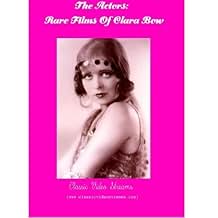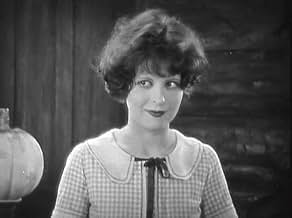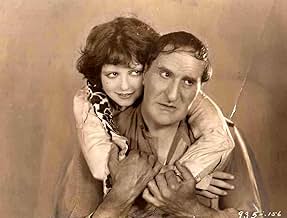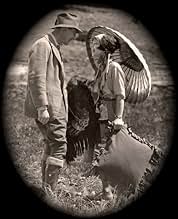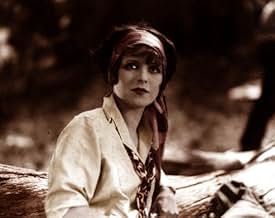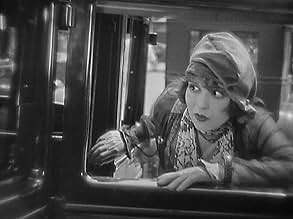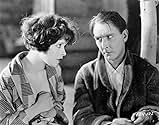A sexy young manicurist living with her older backwoodsman husband in a small Canadian town finds herself attracted to a young, rich and famous divorce lawyer who comes to town on vacation.A sexy young manicurist living with her older backwoodsman husband in a small Canadian town finds herself attracted to a young, rich and famous divorce lawyer who comes to town on vacation.A sexy young manicurist living with her older backwoodsman husband in a small Canadian town finds herself attracted to a young, rich and famous divorce lawyer who comes to town on vacation.
- Awards
- 2 wins total
Chief John Big Tree
- Indian
- (uncredited)
Scotty Mattraw
- Man gets haircut
- (uncredited)
Rolfe Sedan
- Barber
- (uncredited)
Featured reviews
I've had the privilege of seeing a dozen or so of Miss Bow's movies and I would rate this one among the best, after IT. I'm surprised that the current rating is only a 6.6. Clara never looked better than in MANTRAP and was approaching the peak in her career. The soon to be "It" girl, is so vibrant, uninhibited, and full of life as Alverna, the young manicurist from Minneapolis who impulsively marries an older he-man, Joe Easter, from the back country and becomes restless once they return to Mantrap. Poor Ralph Prescott, a divorce lawyer from New York who is at his breaking point from all his flirtatious female clients, decides to take a vacation to get away from everything at the insistence of his friend. Not only does he get wrestled to the ground by his heavy-set friend, played by Eugene Pallate, once they get on each other's nerves, but he gets accepts an invitation to stay at Joe's cabin to get away from living in a tent. Little does he know, that the seductive Alverna awaits him ready to flirt with him every time Joe's back is turned. I think this is a very entertaining romantic comedy from the mid 1920s. Both Ernest Torrence and Percy Marmont, as well as any red-blooded male watching the movie, fall prey to Clara's mischievous grin and beautiful, expressive eyes. I'm so glad that Paramount didn't let this one deteriorate in its vaults. 8/10
What a delightful film - at its best when its comedy, a little weaker in the dramatic bits. Clara Bow is amazing - funny, sexy, completely liberated - she is a free spirit, having sex with whoever she wants to. Her two choices are a little dull though - country bumpkin Ernst Torrence or city lawyer Percy Marmont - both a little old for her, but hell, Hollywood has always put beautiful young women with stodgy older men (studio executive fantasy perhaps?).
It's a well directed film - Victor Fleming went on to direct "Gone with the Wind" and "The Wizard of Oz", and photographed mostly on location by James Wong Howe - so it looks great. But it's Clara that holds it all together - and what an ending! Incidentally she isn't the mantrap - it's the name of the town in Canada where most of the action takes place.
It's a well directed film - Victor Fleming went on to direct "Gone with the Wind" and "The Wizard of Oz", and photographed mostly on location by James Wong Howe - so it looks great. But it's Clara that holds it all together - and what an ending! Incidentally she isn't the mantrap - it's the name of the town in Canada where most of the action takes place.
Of all those long-gone silent movie stars, Clara Bow is one of the few whose name is widely remembered. She is seen as epitomising the Jazz-age floozy; fun-loving and promiscuous in that brief period when these things weren't frowned upon in the movies. Actually Bow played a lot of relatively tame leading lady roles as well – it was her offscreen antics that garnered her reputation. But once in a while she played a role that lived up to the stereotype, as in the bluntly-titled Mantrap.
Mantrap shows Clara at her most lively, playing her effortless flirtatiousness to the hilt. As this is also a comedy she gets to exaggerate a little, proving to be very good at this – humorous, but not overly theatrical. Playing opposite her is the Ernest Torrence, who because of his size and looks was generally cast as villains. He does well against type here though, showing a kind of awkward sensitivity towards Bow. Also to be seen here is Eugene Palette, his tubby sidekick persona just beginning to emerge (although it wouldn't really solidify until the coming of sound added his voice to the mix).
The director was Victor Fleming, one of many action-loving young men working in Hollywood at the time. For Fleming, the image really has to keep moving, and he makes the action snappy with lots of tracking shots and pans round the room. Often this attention-grabbing style is very much functional. For example, he gives Percy Marmont ("Ralph") a very memorable introduction with his face suddenly revealed. This is necessary because he then disappears from the narrative for a while, only to re-emerge as a main character. He saves an absolutely brilliant entrance for Bow herself, having her appear from behind a curtain in the background and, as if incidentally, has her saunter forward until she is in close-up.
Despite what the title implies, Mantrap is a rather playful affair that shows the men in Clara's life as becoming exasperated rather than ensnared by her. It's remarkably even-handed though, and she gets to assert her independence in style. If you want to see the real vision of a 1920s femme fatale, you have to look at the dubiously moral pictures of Cecil B. DeMille. But coming at it from this different angle, Mantrap is more in the way of good-natured fun.
Mantrap shows Clara at her most lively, playing her effortless flirtatiousness to the hilt. As this is also a comedy she gets to exaggerate a little, proving to be very good at this – humorous, but not overly theatrical. Playing opposite her is the Ernest Torrence, who because of his size and looks was generally cast as villains. He does well against type here though, showing a kind of awkward sensitivity towards Bow. Also to be seen here is Eugene Palette, his tubby sidekick persona just beginning to emerge (although it wouldn't really solidify until the coming of sound added his voice to the mix).
The director was Victor Fleming, one of many action-loving young men working in Hollywood at the time. For Fleming, the image really has to keep moving, and he makes the action snappy with lots of tracking shots and pans round the room. Often this attention-grabbing style is very much functional. For example, he gives Percy Marmont ("Ralph") a very memorable introduction with his face suddenly revealed. This is necessary because he then disappears from the narrative for a while, only to re-emerge as a main character. He saves an absolutely brilliant entrance for Bow herself, having her appear from behind a curtain in the background and, as if incidentally, has her saunter forward until she is in close-up.
Despite what the title implies, Mantrap is a rather playful affair that shows the men in Clara's life as becoming exasperated rather than ensnared by her. It's remarkably even-handed though, and she gets to assert her independence in style. If you want to see the real vision of a 1920s femme fatale, you have to look at the dubiously moral pictures of Cecil B. DeMille. But coming at it from this different angle, Mantrap is more in the way of good-natured fun.
this is one of clara bow's best movies. she plays a girl from the big city of minneapolis who marries a man from a small canadian town. they move back to canada in a town called "mantrap," where clara proceeds to flirt with just about every man she meets. the story is rather good for a silent film, but it is clara's personality and stunning beauty that are the main assets in this film. if you are a fan of clara bow, this is definitely a film to check out ( if ya can find it.)
Clara Bow's favorite among her own films is, when seen today, an agreeable if inconsequential silent comedy showing the 'It' Girl in familiar form, impulsively marrying an honest but unexciting mountain man (Ernest Torrance) and soon becoming bored with the great outdoors. Her inability to resist any sort of flirtation leads to a dalliance with prim misogynist Percy Marmont, in the hope that he might return her to civilization. But despite a promising set-up the level of humor is almost too modest, content to provide the occasional lighthearted chuckle instead of the more satisfying belly laugh. Bow's natural vitality and charm carry the film, and the impressive location photography was provided by a fledgling James Wong Howe.
Did you know
- TriviaThis was the first time Victor Fleming directed Clara Bow, and apparently the experience was a pleasant one--he began a long-term personal relationship with her.
- GoofsIn the montage of Joe's trip from Mantrap in Canada to Minneapolis, palm trees can be seen behind some of the houses.
- Quotes
Joe Easter: Well, that sort of upsets my plans. I'd figured on sendin' her to my aunt in Minneapolis...
Alverna: Minneapple sauce!
- ConnectionsFeatured in Hollywood (1980)
Details
- Runtime
- 1h 11m(71 min)
- Color
- Sound mix
- Aspect ratio
- 1.33 : 1
Contribute to this page
Suggest an edit or add missing content

